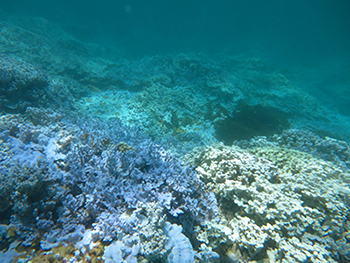- ABOUT US
- PROGRAM AREAS
- CONSERVATION APPROACH
- EDUCATION
- MULTIMEDIA
Oceans under Pressure from Climate Change this Century

Oceans Under Pressure
Scientists with the Oceans 2015 Initiative contrasted the threats that two potential carbon dioxide emission pathways pose to marine ecosystems and the goods and services they provide. Their findings are reported in a paper titled "Contrasting Futures for Ocean and Society from Different Anthropogenic CO2 Emissions Scenarios" published in the July 3, 2015 issue of the journal Science.
The Oceans 2015 Initiative was launched to provide key information on how the future ocean will look to the negotiators of the 2015 Paris Climate Conference (also known as the 2015 United Nations Climate Change Conference, COP21).
Changing Oceans
Humans have already increased atmospheric carbon dioxide by more than 40 percent since the industrial period began. As a consequence the global ocean is changing rapidly, becoming warmer and more acidic. Oceans 2015 Initiative scientists found that these changes will have lasting effects on the planet's marine ecosystems, including coral reefs, and the goods and services they provide to millions of people.
The Oceans 2015 Initiative took a closer look at climate change impacts to the ocean under one pathway where global temperatures warm by no more than 2° Celsius (3.6°Fahrenheit)-consistent with the 2009 United Nations Copenhagen Accord in which nations agreed to work to limit the earth's warming to 2°Celsius above the globally-averaged pre-industrial temperature. The second pathway-consistent with current global carbon dioxide emissions-would see the earth warm by 4° to 5°Celsius (7° to 9°Fahrenheit) by 2100.
Findings Spur Warnings

The authors found that ocean changes associated with the 2°Celsius emissions pathway already carry high risks of damage to warm-water corals and other marine life. Higher emission pathways would result in a very high risk of damage to almost all marine organisms the Oceans 2015 Initiative team considered. Likewise, the risk of impact on ecosystem services worldwide would become high or very high by 2100.
"We are already seeing the impacts of climate change on ocean ecosystems. If we continue on our current path, the damage by mid-century will be tremendous," said Mark Eakin, the coordinator of NOAA's Coral Reef Watch and an author of the paper. "Even if we reduce our carbon dioxide emissions and keep the earth as cool as only two degrees Celsius above pre-industrial conditions, the losses to many ocean ecosystems and the services they provide to us will be unprecedented."
This study also shows that the policy options to address ocean impacts (mitigate, protect, repair, and adapt) narrow as the ocean warms and acidifies.
About Oceans 2015 Initiative
The Oceans 2015 Initiative is led by the French organizations Centre national de la recherche scientifique and the Institute for Sustainable Development and International Relations. The initiative is supported by the Prince Albert II of Monaco Foundation, the Ocean Acidification International Coordination Centre of the International Atomic Energy Agency, the BNP Paribas Foundation, and the Monégasque Association for Ocean Acidification.
For more information, visit: http://www.sciencemag.org/lookup/doi/10.1126/science.aac4722.
About Us

The NOAA Coral Reef Conservation Program was established in 2000 by the Coral Reef Conservation Act. Headquartered in Silver Spring, Maryland, the program is part of NOAA's Office for Coastal Management.

The Coral Reef Information System (CoRIS) is the program's information portal that provides access to NOAA coral reef data and products.
Work With US
U.S. Coral Reef Task Force
Funding Opportunities
Employment
Fellowship Program
Contracting Assistance
Graphic Identifier
Featured Stories Archive

Access the archive of featured stories here...
Feedback
Thank you for visiting NOAA’s Coral Reef Conservation Program online. Please take our website satisfaction survey. We welcome your ideas, comments, and feedback. Questions? Email coralreef@noaa.gov.
Stay Connected
Contact Us
NOAA’s Coral Reef Conservation Program
SSMC4, 10th Floor
1305 East West Highway
Silver Spring, MD 20910
coralreef@noaa.gov
